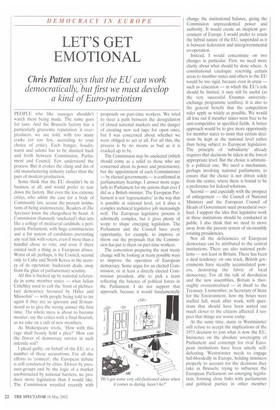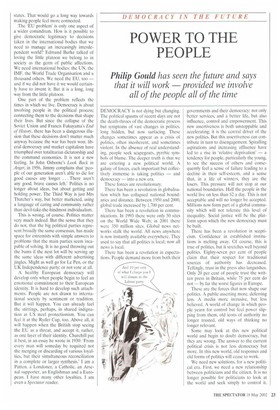LET'S GET EMOTIONAL
Chris Patten says that the EU can work
democratically, but first we must develop a kind of Euro-patriotism
PEOPLE who like sausages shouldn't watch them being made. The same goes for laws. And the Brussels factory has a particularly gruesome reputation: it overproduces, we are told, with too many cooks (or too few, according to your choice of critic). Each banger, boudin, wurst and salami has to be shunted back and forth between Commission, Parliament and Council. Few understand the process. But it evokes the clang and din of old manufacturing industry rather than the purr of modern production.
Some think that the EU shouldn't be in business at all, and would prefer to tear down the factory. But even the less extreme critics, who admit the case for a body of Community law, accuse the present institutions of being undemocratic. Readers of The Spectator know the chargesheet by heart. A Commission (famously 'unelected') that acts like a college of mediaeval cardinals; a peripatetic Parliament, with huge constituencies and a list system of candidates preventing any real link with voters, even if more than a handful chose to vote, and even if there existed such a thing as a European demos. Worst of all, perhaps, is the Council, second only to Cuba and North Korea in the secrecy of its operation: backroorn deals, away from the glare of parliamentary scrutiny.
All this is backed up by national referenda in some member states — what Julian Critchley used to call the 'form of plebiscitary democracy favoured by Hitler and Mussolini' — with people being told to try again if they are so ignorant and ill-mannered as to give the wrong answer the first time. The whole mess is about to become messier, say the critics with a final flourish, as we take on a raft of new members.
As Shakespeare wrote, 'How with this rage shall beauty hold a plea?' How can the flower of democracy survive in such infertile soil?
I plead guilty, on behalf of the EU, to a number of these accusations. For all the efforts to 'connect', the European debate is still conducted by elites. Driven by pressure-groups and by the logic of a market unobstructed by national barriers, we produce more legislation than I would like. The Commission wrestled recently with proposals on part-time workers. We tried to steer a path between the deregulation of closed national markets and the danger of creating new red tape for open ones, but I was concerned about whether we were obliged to act at all. For all this, the process is by no means as bad as it is cracked up to be.
The Commission may be unelected (which should come as a relief to those who are concerned about its power and pretensions), but the appointment of each Commissioner — by elected governments — is confirmed in parliamentary hearings. I answer more regularly to Parliament for my actions than ever I did as a British minister. The European Parliament is not 'representative' in the way that is possible at national level, yet it does a complex technical legislative job increasingly well. The European legislative process is admittedly complex, but it gives plenty of scope to shape emerging legislation. The Parliament and the Council have every opportunity, for example, to improve or throw out the proposals that the Commission has put to them on part-time workers.
The convention preparing the next treaty change will be looking at many possible ways to improve the operation of European democracy. Some argue for an elected Commission, or at least a directly elected Commission president, able to pick a team reflecting the balance of political forces in the Parliament. I do not support that approach, because it would fundamentally change the institutional balance, giving the Commission unprecedented power and authority. It would create an incipient government of Europe. I would prefer to retain the hybrid nature of the EU, suspended as it is between federation and intergovernmental co-operation.
Instead. I would concentrate on two changes in particular. First, we need more clarity about what should be done where. A constitutional catalogue reserving certain areas to member states and others to the EU would be too rigid, because even in areas — such as education — in which the EU's role should be limited, it may still be useful (as the very successful Erasmus universityexchange programme testifies). It is also to the general benefit that the competition rules apply as widely as possible. We would all lose out if member states were free to be anti-competitive in specified fields. A better approach would be to give more opportunity for member states to insist that certain decisions be kept at the national level rather than being subject to European legislation. The principle of `subsidiarity' already requires that decisions be taken at the lowest appropriate level, But the choice is ultimately a political one. We need a mechanism, perhaps involving national parliaments, to ensure that the choice is not driven solely from the centre, where there is bound to be a preference for federal solutions.
Second — and especially with the prospect of enlargement — the Council of National Ministers and the European Council of Heads of Government need procedural overhaul. I support the idea that legislative work in these institutions should be conducted in public. I also think that we need to move away from the present system of six-monthly rotating presidencies.
Not all the deficiencies of European democracy can be attributed to the central institutions. There are also national problems — not least in Britain. There has been a dual tendency: on one track, British governments have steadily accumulated powers, destroying the fabric of local democracy. For all the talk of devolution and the new assemblies, Britain is thoroughly overcentralised — in thrall to the Treasury. I remember, as Secretary of State for the Environment, bow my boxes were stuffed full, week after week, with questions that should have been sorted out much closer to the citizens affected. I suspect that things are worse today.
At the same time, many in Westminster still refuse to accept the implications of the 1973 decision to join what is now the EU. Insistence on the absolute sovereignty of Parliament and contempt for rival European institutions have been utterly selfdefeating. Westminster needs to engage full-bloodedly in Europe, holding ministers properly to account for the decisions they take in Brussels; trying to influence the European Parliament on emerging legislation; forming close links with parliaments and political parties in other member states. That would go a long way towards making people feel more connected.
The 'EU problem' is only one aspect of a wider conundrum. How is it possible to give democratic legitimacy to decisions taken in the international bodies that we need to manage an increasingly interdependent world? Edmund Burke talked of loving the little platoon we belong to in society as the germ of public affections. We need international bodies: the UN, the IMF, the World Trade Organisation and a thousand others. We need the EU, too — and if we did not have it we would certainly have to invent it. But it is a long, long way from the little platoon.
One part of the problem reflects the times in which we live. Democracy is about involving people in the political process; connecting them to the decisions that shape their lives. But since the collapse of the Soviet Union and Francis Fukuyama's End of History, there has been a dangerous illusion that these decisions don't matter much anyway because the war has been won: liberal democracy and market capitalism have triumphed over totalitarian dictatorship and the command economies. It is not a new feeling. In John Osborne's Look Back in Anger, in 1956, Jimmy complains that 'people of our generation aren't able to die for good causes any longer . .. There aren't any good, brave causes left.' Politics is no longer about ideas, but about getting and holding power. The Third Way is just Mrs Thatcher's way, but better marketed, using a language of caring and community rather than devil-take-the-hindmost individualism.
This is wrong, of course. Politics matter very much indeed. But the sense that they do not, that the big political parties represent broadly the same consensus, has made space for extremists with simple answers to problems that the main parties seem incapable of solving. It is no good throwing out the bums if the next lot will be serving up the same ideas with different advertising jingles. Might as well go for Le Pen, or the UK Independence party; or not vote at all.
A healthy European democracy will develop only when people begin to feel an emotional commitment to their European identity. It is hard to develop such attachments. People are not drawn to international society by sentiment or tradition. But it will happen. You can already feel the stirrings, perhaps, in shared indignation at US steel protectionism. You can feel it at the Ryder Cup, too. Above all, it will happen when the British stop seeing the EU as a threat, and accept it, rather, as one layer of their identity. Churchill put it best, in an essay he wrote in 1930: 'From every man will someday be required not the merging or discarding of various loyalties, but their simultaneous reconciliation in a complete or larger synthesis.' I am a Patten, a Londoner, a Catholic, an Arsenal supporter, an Englishman and a European. I have many other loyalties. I am even a Spectator reader.















































































 Previous page
Previous page